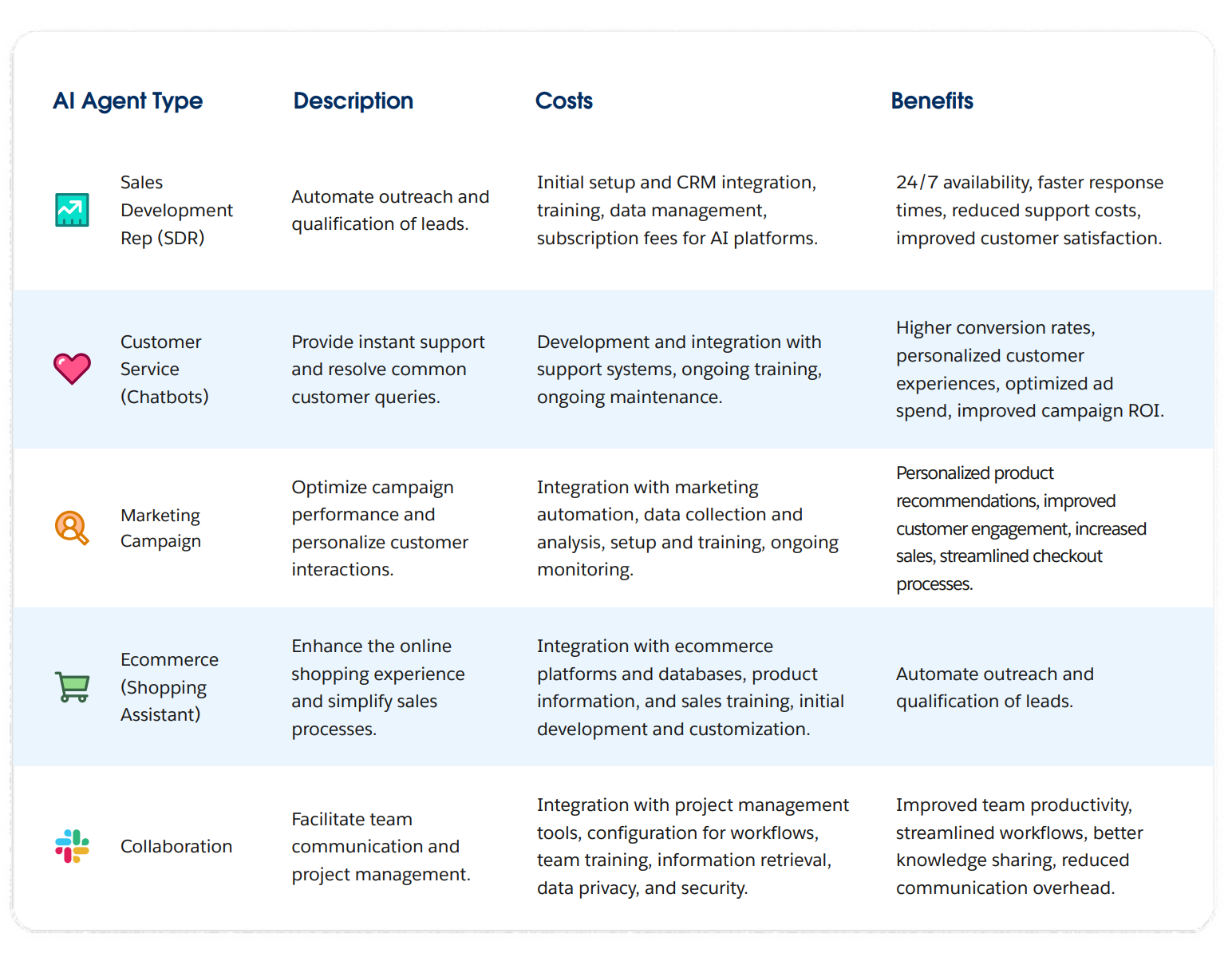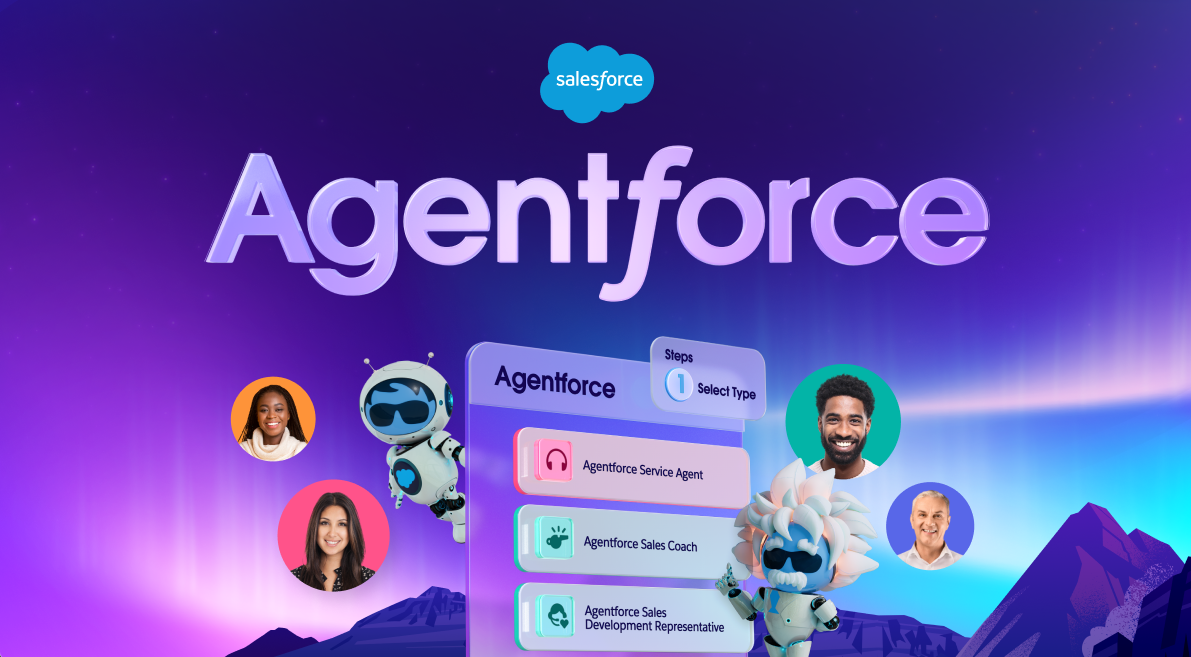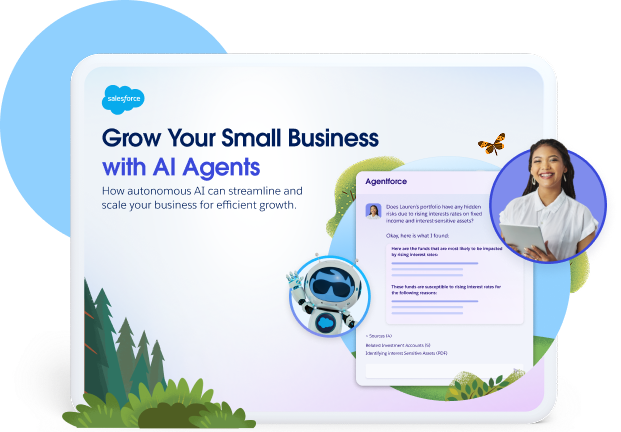Ready to get your time back as a small or medium business (SMB) owner — without the cost sink? This resource is for you.
In the Salesforce for small business resource bank you will find 5 Steps to Implementing AI Agents for Small Businesses, an e-book outlining the five steps to getting your AI agents up and running in your customer relationship management (CRM) system — and no, it’s not too complicated. This free resource will help you understand the actual steps to implementing an AI agent.
If you still need some reasons why AI agents are worth (saving) your time, then read on.
What we’ll cover:
- What are AI agents for small business?
- Types of AI agents you can implement
- 1. Eliminate nearly half of your time waste and achieve serious scale
- 2. AI power is accessible — without the high costs
- 3. AI implementation is a track to ROI, not surface-level upgrades
- Get the guide to AI agent implementation with Salesforce
- Frequently Asked Questions (FAQs)
What are AI agents for small business?
AI agents are autonomous software programs that act as smart, reliable assistants within your CRM system. An AI agent can be trained on your proprietary data to handle routine or manual tasks that take up time, like qualifying sales leads, sending follow-up emails, scheduling meetings, or answering customer questions.
AI agents, or sometimes referred to as AI assistants, like this use technologies like natural language processing (NLP), machine learning, and predictive analytics to learn about your processes and identify areas for improvement. Overall, they are here to help with business functions, save time, and increase productivity.
AI Tools for Small Business
Types of AI agents you can implement
Not sure where to start with implementing your AI agent? Luckily you can deploy an AI agent across almost every aspect of your business, and our handy chart gives you an idea of your choices.

1. Eliminate nearly half of your time waste and achieve serious scale
AI agents offer the most direct path to reclaiming lost time and immediately scaling your operations. The statistics are concerning: A reported 41% of time is lost to low value and repetitive tasks.
By deploying autonomous or assistive agents, you can take those repetitive tasks off your plate. This frees up you and your staff to focus on complex, high-touch human interactions while the agents provide essential services around the clock. When you implement AI agents, some results you can see early on include:
- Faster response times, ensuring that customers receive timely assistance
- Reduced support costs, with AI agents handling a significant volume of customer inquiries
- Improved accuracy, since AI agents can process data and complete tasks with precision
By training AI, you’re not just automating — you’re buying back 41% of your operating time and establishing a 24/7 operational capability that directly reduces costs. This is the essence of scaling with a limited budget and team.
For instance, consider a small ecommerce business that receives a high volume of customer inquiries about order status, product availability, and returns. By implementing an AI-powered chatbot, the business can automate responses to these common queries, freeing up the customer support team to focus on more complex issues. This not only improves customer satisfaction but also reduces the workload on the support team.

2. AI power is accessible — without the high costs
For years, sophisticated AI was an exclusive domain, requiring a considerable technological investment and a dedicated team of specialized engineers. This created a barrier to entry, largely limiting advanced AI adoption to large enterprises with dedicated tech teams.
The recent development of specialized, smart platforms, such as Agentforce 360, has democratized access to AI, making it available to a much broader range of businesses.
This transformative shift means that small business owners are no longer at a disadvantage. They can now effortlessly select or even build AI agents that are meticulously tailored to their specific operational needs and industry requirements. Whether an ecommerce retailer strives to optimize inventory and customer service, a healthcare provider aims to simplify patient scheduling and record management, or a boutique financial firm seeks to improve data analysis, these customized AI solutions are now accessible — to all.
This high degree of customization brings with it a vital financial advantage: a significantly reduced total cost of ownership (TCO) and a quicker return on investment (ROI). “I wouldn’t resist,” said Adam Alfano, EVP of Global SMB and Emerging Products at Salesforce. “I would take action… Get going, but also stay very innovative and evolve as you go.”
This means the entry point for powerful AI is dramatically lower than anticipated for all kinds of businesses. By having accessible tools and prebuilt templates, growing businesses and startups can begin developing operational workflows that allow them to grow fast. “Start with high-value, somewhat simple use cases,” advised Alfano. “You’ll see multistep improvements almost immediately as you get rolling.”
Boost team productivity with Slack
Bring together your team, your customers, and your tools to help take your business to the next level with Slack — it’s where business gets done.

3. AI implementation is a track to ROI, not surface-level upgrades
Successful AI implementation isn’t an abstract technology project: it must be a strategic plan tied directly to your financial and customer satisfaction metrics.
The first step in the implementation guide requires defining objectives based on measurable, quantifiable outcomes. Focusing on outcomes will transform AI from a simple tool into an investment with a clear and high potential for return for your business. A well-defined set of objectives or metrics guarantees that your chosen AI solution contributes directly to your strategic business outcomes.
Here are some example metrics (not guaranteed) you can start with today — make sure to include important context to keep your team on track:
- Track lead conversion rates through AI-powered predictive analytics for sales.
- Track service response times by implementing AI chatbots for initial inquiries.
- Track operational costs through AI-driven automation of repetitive tasks.
- Track employee productivity by using AI tools to simplify administrative functions.
5 Steps To Implementing AI Agents For Small Business
Get the free e-book and get your AI agents up and running.


Get the guide to AI agent implementation with Salesforce
Ready to implement your very own AI agent? We thought so. Download the free ebook today to get the full potential of AI agent implementation for your business, specifically tailored for startups. This in-depth guide provides actionable strategies and expert insights to help you seamlessly integrate AI agents with your existing Salesforce ecosystem.
And, we’re here for it. Start your journey with a free trial of Starter Suite today. Looking for more customization? Explore Pro Suite. Already a Salesforce customer? Activate Foundations to try out Agentforce 360 today.
AI supported the writers and editors who created this article.
Frequently Asked Questions (FAQs)
An AI agent is a smart software program that helps with tasks in your business systems, like CRM. It learns from your data to automate routine jobs such as qualifying sales leads, sending emails, or answering customer questions, which saves you time.
By automating low-value or repetitive activities, AI agents can reclaim lost time, allowing you and your staff to focus on more complex, high-value interactions and strategic initiatives.
Historically, sophisticated AI has required substantial investment. However, with the emergence of specialized platforms like Agentforce, AI power has become much more accessible and affordable for SMBs.
Successful AI implementation isn’t about vague tech upgrades. It’s about quantifiable ROI. By defining clear objectives for your AI strategy, increasing sales conversion rates, or simplifying internal workflows, you can directly tie your AI investment to measurable business success.






























